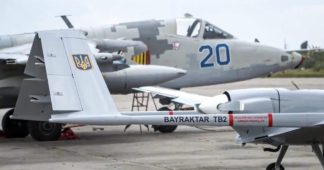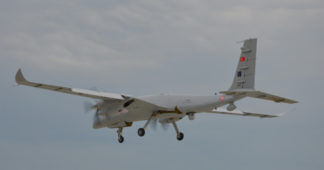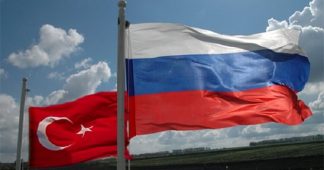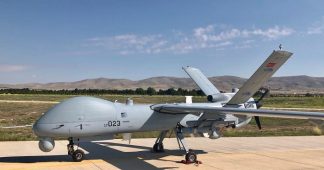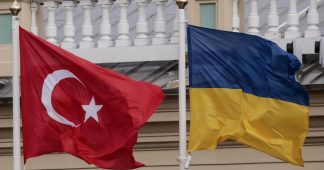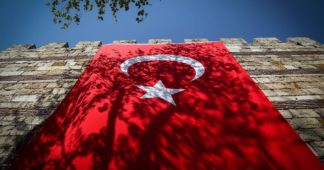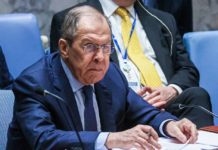Posted on Categories
Turkish and Ukrainian news sources announced on July 15 that the Ukrainian Naval Forces Command has received the first Bayraktar TB2 unmanned combat aerial vehicles from Turkey, a fact confirmed by Ukrainian Defense Minister Andriy Taran. Two weeks ago Ukraine deployed one of the Turkish combat drones for the joint U.S.-Ukraine-hosted 32-nation Sea Breeze war games in the Black Sea. The Ukrainian army already possesses Bayraktar TB2s, but now they will enter the navy’s arsenal as well.
Kiev had ordered the drones as well as MILGEM Ada-class anti-submarine warfare corvettes from Turkey late last year. (Guess who the latter will be used against.) The corvettes are the same model as those Turkey is building for Pakistan, its strategic ally in the Ankara-Baku-Islamabad military axis.
The commander of the Ukrainian navy, Rear Admiral Oleksiy Neizhpapa, confirmed the combat drones will be delivered to the navy by the end of this year. He also said that in addition to the drones Ukraine will receive from Turkey “a full-fledged system that will be used to perform a number of critical tasks in the Azov and Black Sea operational regions.” https://c0.pubmine.com/sf/0.0.3/html/safeframe.htmlReport this ad
That is, exactly where Ukraine and Russia are engaged in at times open confrontation over territorial disputes.
The admiral added this intriguing rhetorical flourish: “The Navy, like other types/branches of the Armed Forces, like the entire civilized world, is switching to unmanned technologies. This is a step forward.” Russia is no doubt excluded from his definition of civilized world.
He also said that among the expanding inventory of Turkish weapons Ukraine is amassing for its war in the Donbass region and impending confrontation with Russia over Crimea are unmanned countermine systems. Turkey is a leading manufacturer of battlefield unmanned ground vehicles as well as unmanned combat aerial drones.
Ukraine and Turkey signed two agreements on military cooperation last year, in October and December. At the October meeting Ukrainian Defense Minister Andrii Taran and Turkey’s Head of the Presidency of Defence Industries İsmail Demir signed a memorandum to launch and initiate joint projects to build “warships, unmanned aerial vehicles and all types of turbines.”
The National News Agency of Ukraine report on the new transaction adds this: “Turkish drones have demonstrated their effectiveness during hostilities in Syria, Libya and Nagorno-Karabakh.”
Ukraine will be the fourth battleground for the deployment and use of Turkish Bayraktar TB2s.
The overall level of military cooperation and integration between the two nations a NATO member and NATO Enhanced Opportunities Partner, is proceeding at a breathtaking pace.
Last week an Turkish-Ukrainian Akıncı assault drone broke an altitude record for Turkish aviation by flying at a height of 38,000 feet and remaining in the air for 25 hours and 46 minutes.
At the Antalya Diplomacy Forum in Turkey the foreign ministers of Turkey and Ukraine, Mevlüt Çavuşoğlu and Dmytro Kuleba met to discuss yet further strengthening bilateral military cooperation. The Ukrainian Foreign Ministry account of the result of that encounter contained this:
“Mevlüt Çavuşoğlu assured that Turkey would continue to support Ukraine’s Euro-Atlantic integration in all possible ways. The ministers discussed the possibilities of enhanced cooperation between the Ukrainian and Turkish navies which will help implement NATO standards in the Ukrainian Navy, increase their defense capabilities and interoperability with NATO member states, and generally strengthen cooperation between the countries for security in the Black Sea.”
Recall the earlier statement about “a full-fledged [Turkish] system that will be used to perform a number of critical tasks in the Azov and Black Sea operational regions.”
At the same event Ukrainian Foreign Minister Kuleba said: “Drones are needed to deter Russia so that Russia thinks twice, before planning, any escalation or any large-scale attack on Ukraine.”
In April Ukrainian President Volodymyr Zelensky was in the Turkish capital of Ankara to join the nation’s president, Recep Tayyip Erdoğan, in a tête-à-tête and a meeting of the Strategic Ukrainian-Turkish Council that produced a twenty-point statement. In that document Turkey fully backs the position of Ukraine and its sponsors in the U.S., NATO and European Union in regard to forcing the Donetsk and Lugansk republics to return to Ukraine, driving Russia out of Crimea and granting NATO membership to Kiev.
Shortly before that a meeting of the Quadriga (2 + 2) format was also held in Ankara, in which format one representative each from the two nations’ foreign and defense ministries meet to solidify their strategic military and foreign policy partnership. That meeting also demanded that Donetsk, Lugansk and Crimea be returned to Ukraine, referring to Crimea as “temporarily occupied by the Russian Federation.” It also recommended further cooperation in the defense sector between Ukraine and Turkey.
The regular meetings of the Strategic Ukrainian-Turkish Council at heads-of-state level and the joint meetings of defense and foreign ministers of the two nations demonstrate the strategic cooperation between Ukraine and Turkey in the foreign policy and military spheres.
A degree of cooperation that lends credence to the contention expressed by Armenian-Lebanese scholar Yeghia Tashjian earlier this year:
“[My] greatest fear is on a regional level. It is no secret that Ukraine is preparing for war or at least triggering an armed conflict in Russian-controlled Donbass with Turkish and Western blessings. It has been two weeks [early March] since I began monitoring the Ukrainian and Russian army’s supply routes and deployment of heavy weapons near Donbass. Kyiv, motivated by the Turkish and Azerbaijani victory in Artsakh [Nagorno-Karabakh], tried to establish military relations with Turkey and bought Turkish Bayraktar TB2 drones. Russia [is] aware that it may engage in a two-front war….”
Tashjian’s comments are increasingly looking prophetic
Published at news.antiwar.com
